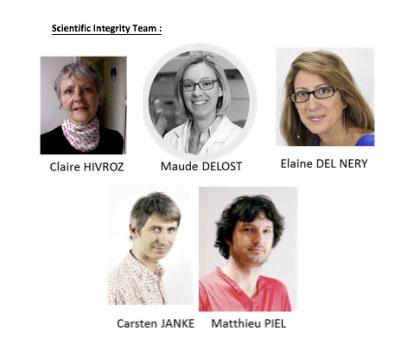Indeed, doing “good science” implies doing it with honesty, accuracy, efficiency and objectivity and this involves knowing the rules and norms but also thinking about what we can do individually and collectively to make sure that these shared values are at the heart of our concerns when we are doing science.
In 2016, the “rapport Corvol” made 16 proposals to promote scientific integrity in France. Among them, one proposal was to organize courses for students. But, the Advanced Training Office from Institut Curie was the predecessor. Indeed, the idea to tackle this issue and promote awareness was envisaged back in 2011 by Claire Hivroz and Vassili Soumelis at Institut Curie. Their first step, with the help of the Advanced Training Office and Pr. Claude Huriet, chairman of the Executive Board back then, was to organize a symposium on Scientific Integrity entitled "Let's Talk Ethics", the first of its kind in France, in April 2012. This allowed them to establish contact with other researchers interested in this problem and to create an event likely to raise awareness to scientists from Institut Curie and other institutes in France. During the symposium, there were some shocking results presented by Pr. Melissa Anderson (University of Minnesota), who reported that 33% of the scientists surveyed (3,247 out of 7,760) admitted, in an anonymous questionnaire, having already defrauded during their career (published in Nature, 2005). Dr. Nils Axelsen shared his experience, as a referent for scientific integrity, at Statens Serum Institute in Copenhagen. He reported that the occurrence of a resounding scandal involving a Danish researcher in neuroscience had pushed the universities and institutes in Denmark to put tools in place to fight against fraudulent scientists.
Following this symposium, other researchers at Institut Curie joined Hivroz and Soumelis to put together a half-day course on scientific integrity for PhD students. From May 2013, this course was made compulsory to all new PhD students joining Institut Curie but also open to all members of the institute.
Soon after, in January 2015, Institut Curie signed the ‘French National Charter for Research Integrity’ (see charter below), which set the criteria for a rigorous and honest scientific approach. More recently, since February 2018, the Advanced Training Office and Claire Hivroz with “Atelier des Jours à Venir” have organized several workshops about mentoring and scientific integrity for young principal investigators.
Today, the team involved in fostering responsible conduct of research at the Advanced Training Office is constituted of Claire Hivroz, Maude Delost, Elaine Del Néry, Carsten Janke and Matthieu Piel.
With practice the course has changed. Talking about scientific integrity is not only talking about frauds and misconducts in science, although they unfortunately do exit. Besides, real situations are not always covered by codes and norms. It seems much more important to think about dilemmas and situations happening in real life research for which we have to work out the best solutions to do “good science”. Thus, the course consists of a rapid overview of what scientific integrity is as well as responsible conduct of research, illustrated by examples, which is followed by a discussion of case studies in small groups.
Supported by the Advanced Training Office and the dedicated members, the work continues to promote and raise awareness on scientific integrity and they hope to put in place the necessary tools to develop an environment where the issues of scientific ethics and responsible conduct of research are at the core of the development of scientific projects and careers at Institut Curie!

